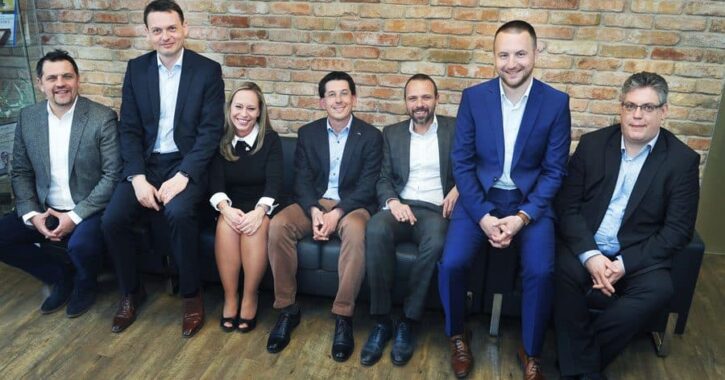Founded at the end of 1996 by the six private individuals, Dorsum is primarily a brokerage firm offering brokerage software. The capital market opened just before, and it became possible for individuals to buy government securities, corporate bonds or even hold money in shares. Over the upcoming years, more than a hundred brokerage firms focused on this opening, but it was increasingly difficult to keep their customers’ transactions and accounts transparent.
Dorsum developed its first software because of this, and in the early days, customers were handed it over to each other. But most of these brokerage firms do not exist today. Market consolidation in the midst of mergers, acquisitions, disappearances, and spectacular bankruptcies (such as Buda-Cash) has smashed the players, and nowadays only on two hands it can be counted how many large scale companies left on their feet.
It can be seen well afterwards, which was not at all clear at that time: Dorsum managed to despise in the IT solutions within the IT and within the investment branch. This is a niche market within the niche market, from which further business opportunities had to be phased out.
In the second half of the 2000s, the company succeeded in leveling. On the one hand, they entered their software into the asset management business of large banks (CIB, MKB or OTP, for example), and opened a subsidiary in Romania and Bulgaria. Imre Rokob, Director of Business Development, told us that in the two Balkan countries, EU accession in 2007 made international expansion possible. The less transparent framework of the financial sector was then necessarily placed on EU funds, and this was already known by the Hungarian development team and managed well.
At that time, nearly 100 people were working in Budapest, and the development was organic throughout, meaning they didn’t buy other companies. This is still the case today. They are generally recruiting developers twice a year and building on speed: a few days after the job fair, Dorsum’s office is usually attended by 30-40 pre-selected beginner professionals, 10 of whom are very quick being offered a job opportunity.
This is a faster pace than the multinationals have, and if potential new employees see the company as a professional and have the recommended salary in the appropriate range, they are no longer looking for other options.
Imre Rokob says that Dorsum has the advantage that it is no longer a startup, but it is not multi-level, based in Budapest, but it also carries international projects, and this mix can be convincing for many beginners.
Anyway, the numbers show that the company lives with intellectual added value. In 2017, gross per capita personnel costs were around 750,000 forints per month, rising 10-15 percent per year. This year’s revenue plan is close to HUF 5 billion, and is expected to cost roughly HUF 4 billion, of which 90 per cent is paid to employees. To simply put, highly qualified IT professionals, financial experts and corporate administration sit in the office building at the foot of the Buda Castle, with laptops on the desk, so there is hardly any cost other than wages and benefits.
The founders owned the company for a while through an offshore company. As they told, at that time, they considered this opportunity as a formal, technical business tool, but when the offshore suddenly became a sweardword in Hungary, the original conditions were restored.
Fluctuation is minimal, and employees have been working at Dorsum for an average of 8 years, which is a long time in IT. It has happened that somebody has suddenly decided to be a tour guide, but it is considered by the company history as an exceptional and not usual phenomenon.
In 2015, growth brought a new choice for the company: they practically grew out of the country. Then it was necessary to decide whether to try to build a general software house from Dorsum (understand: basically they stay with the existing clientele and develop other banking software) or stay in their narrower area, the wealth management market and expand abroad. The second version won.
Asset management software is not easy to move between Eastern European countries, even though there are many unique conditions that have to be met despite the EU framework. The major Western European competitors are not moving to the eastern market, because they are relatively small in size from the west, fragmented and almost impossible to survive without local expertise. This gives Dorsum the opportunity to get customers from Warsaw to Sofia more easily by adapting to local conditions.
The possibility of buying Dorsum by a major IT company, such requests continue to come in handy, but the owners have not yet entered this route. From the founders, Róbert Kő has remained the dominant owner (as CEO), and although Zoltán Spéder also had a call option for the company last year, it was finally closed by Károly Gerendai and his partners from Sziget investing in the business.
Imre Rokob says that in the future it is possible to have an external investor who enriches the company with professional content. Current growth comes from stable customer base, with the top ten partners accounting for 70 percent of the company’s revenue. In the future, it may be interesting for a professional investor to take Dorsum to new, western or distant markets, but to keep his current position; such an option has not yet emerged.
„Domestic sales account for 70 percent of revenue, but growth is now mainly coming from abroad, so I want to increase exports to 50 percent. That is, it should be equal to the sales in Hungary, which are also expected to grow.”
The original article can be read in Hungarian here.



